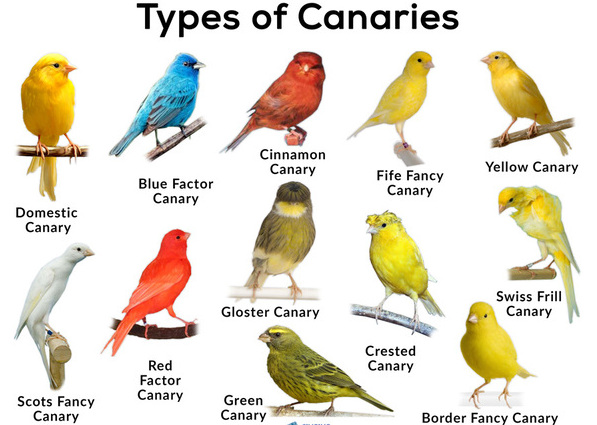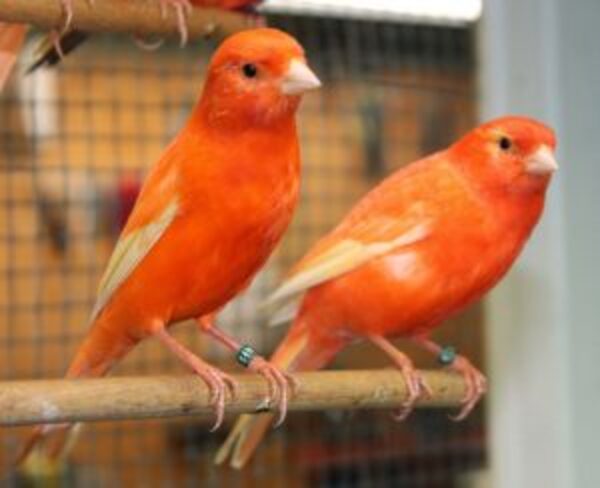Canary birds, also known for their charming singing and vibrant colors, are popular pets among bird enthusiasts. Whether you’re considering adopting one or are simply curious, this guide dives into every aspect of canary birds, from their origins to care tips.

Canaries (scientific name Serinus canaria) are small songbirds in the finch family. Native to the Canary Islands, Azores, and Madeira, they were first domesticated by Europeans in the 17th century. Over centuries, selective breeding has led to various breeds of canaries, each with distinct traits.
Key Characteristics:
Small size: 4.7–5.5 inches long.
Weight: Around 12–20 grams.
Color varieties: Yellow, white, red, and green are most common.
Lifespan: 10–15 years in captivity with proper care.
Types of Canaries:
Colorbred Canaries: Known for their vibrant hues, like the Red Factor Canary.
Song Canaries: Famous for their singing abilities, such as the German Roller Canary.
Type Canaries: Valued for their unique shapes, like the Frill Canary.
Canaries are relatively easy to care for, making them ideal for beginners. However, providing a nurturing environment is crucial to their health and happiness.
A canary's diet primarily consists of:
Seeds: High-quality seed mixes tailored for canaries.
Fresh Vegetables: Kale, spinach, and carrots are excellent choices.
Fruits: Apple slices (without seeds) and small amounts of banana.
Protein: Boiled egg or specialized egg food during molting and breeding seasons.
Fresh water must always be available.
Cage Size: A cage of at least 18x18 inches is ideal for a single bird. Larger cages are better for more activity.
Perches: Provide natural wood perches of varying diameters.
Toys and Accessories: Include mirrors, bells, or swings for mental stimulation.
Regularly clean the cage, perches, and food dishes to prevent illness.
Ensure the room is draft-free but well-ventilated.
Monitor for common issues like mites, respiratory infections, or feather plucking.

One of the main reasons people love canaries is their melodious singing.
Why Do Canaries Sing?
Male canaries sing to establish territory or attract mates. Females rarely sing but may chirp.
Encouraging Singing:
Provide a stress-free environment.
Maintain a consistent day-night cycle (10–12 hours of light).
Play recordings of other canary songs to inspire them.
Why Is My Canary Not Singing?
Molting or seasonal changes can temporarily suppress singing.
Stress, illness, or lack of stimulation may also be factors.
While canaries aren’t typically cuddly pets, they are fascinating to observe and can even recognize their owners over time.
Canaries are intelligent birds that can learn to associate you with food and care. They may chirp or sing when you enter the room, signaling familiarity.
Canaries generally prefer solitude but can coexist with other small, non-aggressive species like finches in a large cage or aviary.
Avoid housing them with aggressive birds, such as parakeets or cockatiels.
Breeding canaries can be rewarding but requires preparation.
Setting Up: Provide a breeding cage, nest, and nesting material like soft fibers or shredded paper.
Mating Season: Spring is the optimal time for breeding.
Egg Laying: Female canaries typically lay 3–5 eggs. Incubation lasts 13–14 days.
Care for Chicks: Ensure parents have access to high-protein food during this period.

Canaries are relatively hardy but can suffer from certain health problems:
Mites: Feathers or red mites can cause itching or feather loss. Treat with specialized sprays.
Respiratory Infections: Keep the cage clean and avoid exposing birds to smoke or drafts.
Overgrown Nails/Beak: Regularly check and trim as needed.
Canaries have a rich history intertwined with human life.
Symbolism: Historically, canaries symbolize joy, freedom, and resilience.
Coal Mines: In the 19th and early 20th centuries, canaries were used in coal mines as early detectors of toxic gases.
Breeding Evolution: Centuries of breeding have created the diverse and specialized canaries we see today.
Where to Buy Canaries:
Pet stores
Online breeders
Bird adoption agencies
Cost of Canaries: Prices range from $50 to $300 depending on breed and singing ability.
Essential Accessories:
Food and water dishes
Cage covers for nighttime
Calcium supplements for beak and bone health
| Feature | Canaries | Finches | Parakeets | Cockatiels |
|---|---|---|---|---|
| Singing Ability | High (Males sing) | Chirpy, less melodic | Limited | Whistling sounds |
| Maintenance | Low | Low | Medium | Medium |
| Interaction Level | Observational pets | Similar to canaries | Social, need attention | Social, need attention |
| Lifespan | 10–15 years | 5–10 years | 5–15 years | 15–20 years |
Canaries are ideal for individuals or families looking for low-maintenance, visually appealing, and melodious pets. Their gentle temperament and straightforward care needs make them a favorite among bird lovers.
If you enjoy the soothing sound of birdsong and the joy of observing a cheerful little companion, a canary might just be the perfect pet for you.
By understanding the needs and behaviors of canary birds, you can create a fulfilling environment for these lovely creatures. Whether you're a first-time bird owner or a seasoned aviculturist, canaries are sure to bring joy to your home!
animal tags: Canaries
We created this article in conjunction with AI technology, then made sure it was fact-checked and edited by a Animals Top editor.